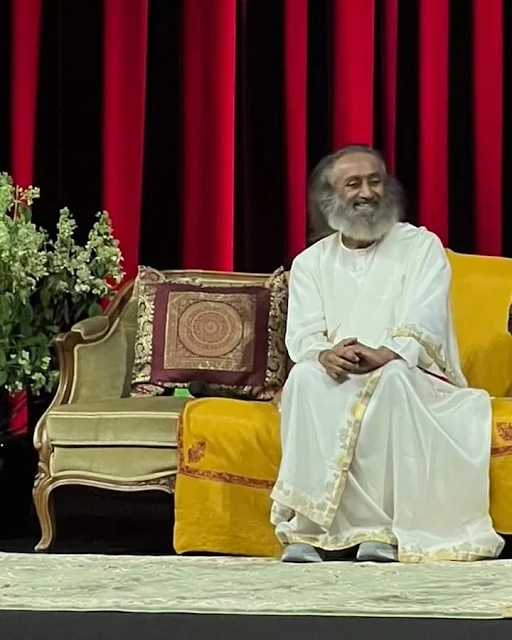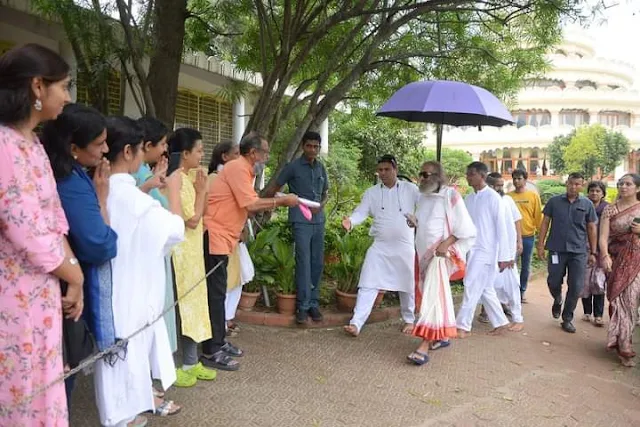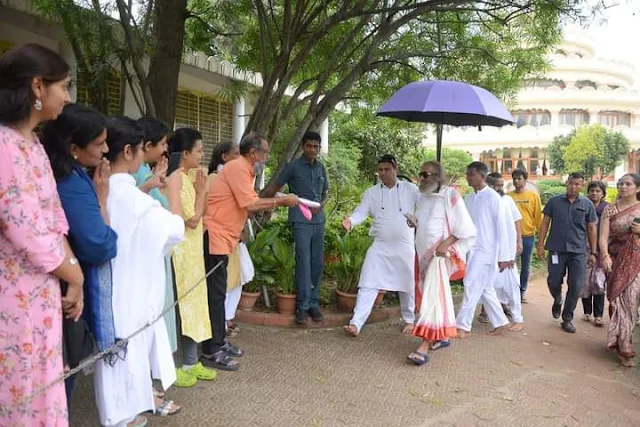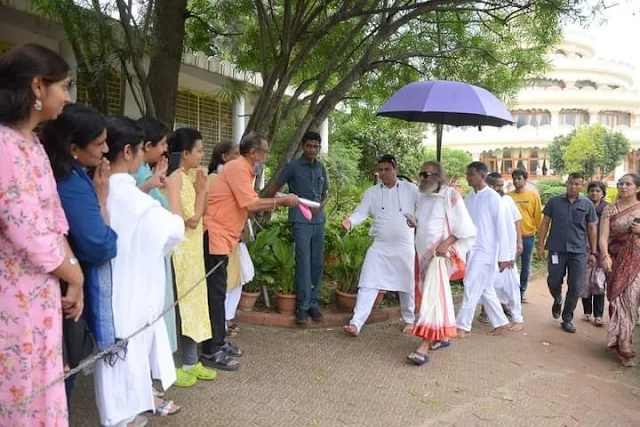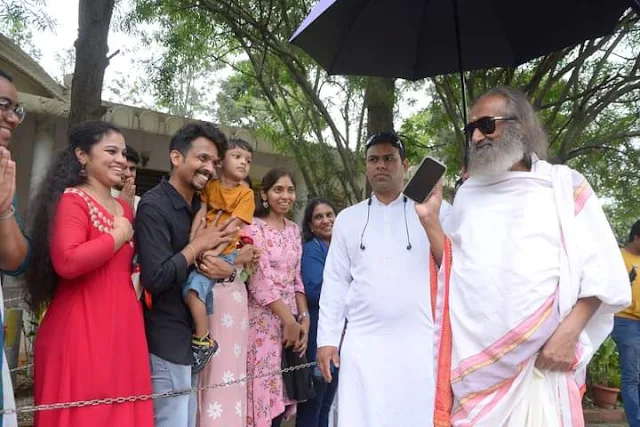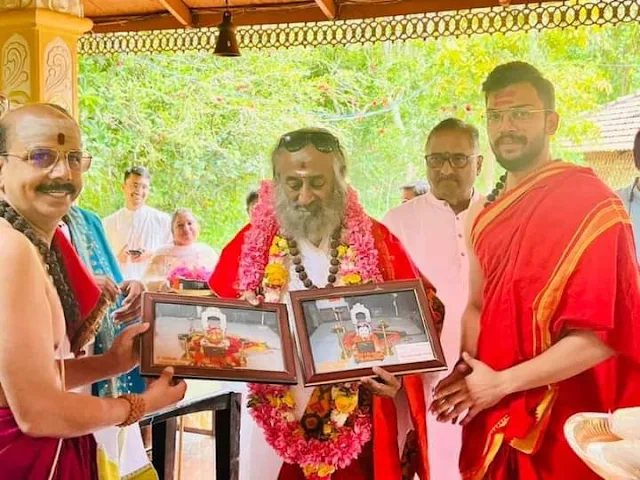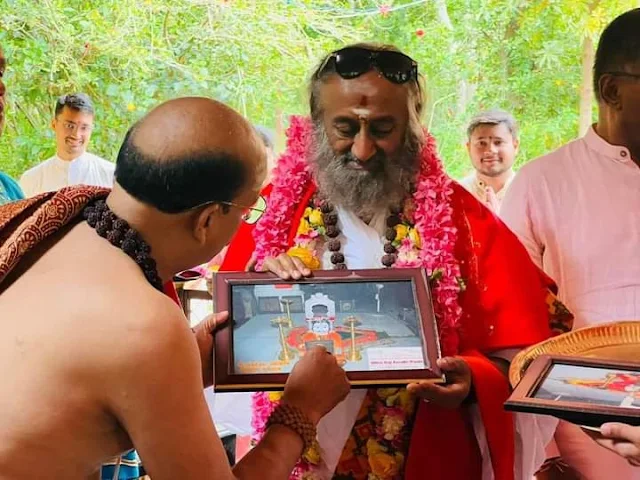Chapter 10 - Management & Meditation
Day 20
5. Yoga and the Breath - Our breath can play a vital role in cleansing us of our negative emotions. We have experimented with this and tested it in many prisons around the world.
120,000 prisoners around the world practised a few breathing exercises and they were able to get rid of the hatred, anger and vengeance that clogged their minds and hearts. Within every culprit is a victim crying out for help.
It is stress, the lack of a broad
outlook on life, a lack of understanding and bad communication that foster violence in society.
If we observe a baby, we will find that from the time of birth until the age of three, it does a lot of exercises, exercises which we, as adults, don't do.
In fact, a baby does a lot of yoga exercises. If you closely follow what a baby does, then you won't even need a yoga teacher. Each of us has practised yoga as a baby.
For instance, one of the things that a baby does is to lie down on its tummy and lift its legs up. Then, it puts one hand on the floor and raises the other hand.
Yoga has developed like that. Yoga means making you child like, full of enthusiasm, joy and a sense of belonging with everybody. The way a child breathes is very different from the way adults breathe.
Our breath is linked to our emotions. We may be upset, unhappy or agitated and may want to get rid of these feelings. But we may not know how to do it.
And it is in such a situation that our breath offers us a most precious secret. We can get rid of such negative emotions by understanding a few patterns and rhythms of breath.
Then, we will have a good amount of control over how we feel. Often, we say that we feel bad as though we are a victim of our feelings, as though we can't do anything about our feelings and emotions.
But our breath gives us the secret to handle them, whether they are anger, frustration, fatigue or stress. We can change, in 5-10 minutes, any tendencies which are not life supporting, by changing our own breathing pattern.
The Art of Living has been very successful in this respect. And these practises are being taught the world over. Currently, 27% of Europe is reeling under depression.
I was given this statistic a couple of years ago at a meeting of the Psychologists Congress of Europe in Athens, Greece, which I was invited to address.
And they had projected that in the next eight years, this figure could go up to 48%. They exclaimed that they could not possibly give Prozac to the entire population.
And even if they did, its effectiveness would decline with greater usage. Then they would have to look for alternative solutions.
They wanted to see the research that we had done at the All India Institute of Medical Sciences and the All India Mental Health and Neuro-Sciences Institute of the Government of India.
This research showed that the breathing exercise of sudarshan kriya and pranayama could eliminate depression, mental tension and stress.
Millions of people have been relieved by these techniques. Science has also authenticated it with systematic research. Learning about our breath can help us in many ways.
Ultimately, it helps in making society crime-free and violence-free. When the prisoners learn these techniques, they wonder why these were not taught earlier.
For perhaps, they would never have done anything wrong and been imprisoned in the first place. The ultimate outcome of applying these techniques is a crime-free society, a disease-free body and a quiver-free breath.
You may have noticed that your breath becomes very shaky sometimes. Many of our problems manifest through irregular breathing patterns.
The mind is often inhibited. It has an opinion, an image about somebody. But then it changes and many times we are not even aware of how fast it changes.
You may notice that your opinions about people change all the time, sometimes even in a matter of a few minutes. An intellect free of inhibitions and a memory free of any kind of trauma - these are the birthright of every individual in society.
We all want a violence-free society. There is so much street violence around the world. The perpetrators of this violence need help.
Every culprit is a victim too, and if you heal such people and teach them to manage their anger and aggression, they will understand things better. They will become positively dynamic and channelise themselves better.
When we practise breathing exercises and sudarshan kriya, our immune cells multiply many times, making us far less prone to disease. Again, this is scientific research I am speaking about.
A healthy person in a healthy society will be able to achieve all these goals - a disease-free body, a quiver-free breath, a confusion-free mind, an inhibition-free intellect, a trauma-free memory and a sorrow-free soul.
But we all have to unite and see how we can bring this about. Today, our society is beset with issues of violence and terrorism and this is because we have not globalised wisdom.
When a child grows up thinking that people following his religion alone will go to heaven and everybody else will go to hell, then that child is going to create a big problem for everybody when he grows up.
Instead if every child is educated in an atmosphere of acceptance then he will never grow up to endorse terrorism. He would never come to be a narrow-minded, fanatical fundamentalist.
6. One World Family - Think of everyone around you as a member of the same family. They may be of a different religion, race, culture or nationality. It does not matter.
They are all a part of you, a part of your own family. This broad vision needs to be promoted in the world today. What is needed most is that we respect and honour each other.
We live in a global village, even if a small part of the globe is left behind in darkness, the world is not a safe place. We accept food from every part of the world.
We eat Danish cookies and Chinese food. People everywhere listen to all sorts of music. The technology we use is completely globalised. Even our clothes reflect this global culture.
In the same way, we must globalise our wisdom. I feel there is a strong need for this. We don't become Chinese just by eating Chinese food.
In the same way, we don't become Indian just by practicing yoga or meditation. All knowledge that is available in the world belongs to everybody, is common to the whole world.
Mankind needs to be seen as one global society. It is when this is lacking that there is war, stress and all sorts of tensions.

